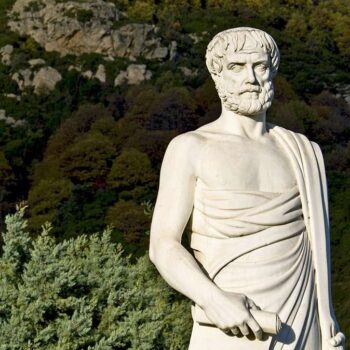The earliest Greek philosophers are typically known as “Presocratic” philosophers. Yet this designation as “Presocratic” first was explicitly used in the 18th century as historians of philosophy attempted to re-catalog the discipline’s past. As a temporal reference the term is a misnomer since some of the “Presocratics” were also Socrates’ contemporaries. As a practical and now well-established classification, however, we might maintain the term to designate a group of Greek thinkers in the sixth and fifth centuries BCE who were intellectually concerned with issues of natural philosophy and/or speculative metaphysics that were of primary relevance prior to the Socratic and Sophist turn toward questions of ethics.
Though much of the thought of these philosophers from Thales (620-546 BCE), who is classically regarded as the first Western philosopher, onwards was focused on questions of the natural world and was proto-scientific, many of the “Presocratics” also challenged the conventional Greek views of the gods and re-conceived of the divine in various ways. They re-conceived the soul. They produced a form of thought that begins to turn against “mythological” explanation. Yet the traditional view that they represent a decisive move from “myth” to “reason” is oversimplified. For one thing, myth itself is infused with reason. For another, some of the earliest thinkers recognized as philosophers used poetry and myth among their devices for reasoning.
It is clear that mythical-religious thinkers — from Egypt to Mesopotamia to Persia and India — prior to the early Greeks had well-developed views about metaphysics, ethics, politics and the other issues of philosophy. They had philosophic perspectives, which did influence the Greeks. Thales and later Pythagoras are known to have lived in Egypt and to have been influenced by Egyptian thought. Plato had some knowledge of Zoroastrianism. Aristotle mentions dualistic ideas of the Persian magi (cp. Laks, 5). Yet we do see from the 6th century BCE onward the focus on a new kind of reasoning in Greece. It is one more naturalistic in tone than what had been dominant — that is, it does not claim to offer a revelation but to result from natural processes of reasoning. But the philosophy that was emerging was also not only a naturalistic form of reasoning. Science, in some forms independent of philosophy, was being practiced. Many of the Presocratics practiced this, too, but they also did so against the background of metaphysical questions.
Whatever the focus of their individual thought, Presocratics are characterized by the presupposition that reality is rationally structured and that some methodology of rational and/or evidence-based argumentation can be used to settle disputes about the correctness of one’s worldview. Generally the Presocratics develop a cosmology — a vision of reality as a whole that surpasses the views of science alone. That said, many of them also did science. Indeed, the Presocratics proposed some broad views about the natural world that we also now accept as true, even if for different reasons than those they proposed. For example, Democritus (460-370 BCE) and other early Atomists argued that all things are comprised of tiny particles known as atoms; and Anaximenes (585-525 BCE) argued that in the course of its history the earth underwent a process of evolution. Though they lacked a full scientific method that since the 17th century has led to the great development of knowledge, the Presocratics created an opening for a scientific naturalistic outlook.
Plato offered one of the earliest cataloguings of early Greek philosophy but as it played into his own system of thought. He contrasted “Heracletians,” who emphasized sense experience and the changes in the world, with “Eleatics” (like Parmenedes and Zeno) who focused on the need to bend our views to logic, even if doing challenged the most common sense of our sense experience. This classification scheme fit with Plato’s own view of himself as the more sophisticated synthesizer of these schools, who in a certain sense completed the project of early Greek philosophy. The world of sense experience, in Plato’s view, is highlighted by the Heracletians, while the Eleatics prepare the ground for Plato’s own view of the reality of a supersensible realm of unchanging ideas. Truth, in Plato’s view, comes through conceptual reasoning, not through the sense experience. In this he sees himself as completing the Parmenedes’ project (cp. Laks, 83 ff.). To understand Plato and how he sees himself as responding to the thinkers of his time, this is important.
However, historians of philosophy today understand Plato’s own cataloguing as deeply flawed. One recent suggestion for cataloguing this early thought is topically as relating to (a) the study of nature related to cosmological order, (b) “cultural polemics”, (c) considerations of the soul, and (d) processes of reasoning (see Sassi, xv.). We see this group of thinkers take up these issues, some devoted with greater focus to one, some to another.
Proceed to the Ionians
